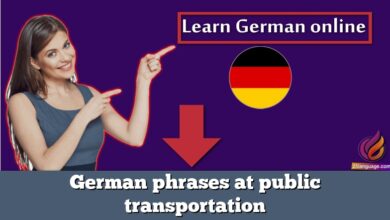German Prepositions

German Prepositions. Prepositions (Präpositionen) are also called ratio words. They are invariant and thus never declined. They usually come before the Noun (Nomen) or Pronoun (Pronomen) to which they refer.
That means they cannot stand alone!

In some cases, their use is not quite simple.
- If German is not your native language, the translation will only help you partially because they are probably used differently than in your native language.
- You should learn which Prepositions you have to use in which situation.
- There are different types of Prepositions: Local, Modal, Temporal and Causal.
⇒ The Prepositions always determines the case of the noun.
Types of Prepositions
A distinction is made between Local, Modal, Temporal and Causal Prepositions.
Local Prepositions
- Local Prepositions describe a Position or a Movement.
- Local: ⇒ auf einen Ort/Position bezogen
- Question: Wo? Wohin? Woher?
A: „Wo bist du?“
B: „Ich bin vor dem Kino. Ich warte neben dem blauen Mercedes.”
Temporal Prepositions
- Temporal Prepositions describes time. Wann passiert etwas? Wie lange dauert etwas?
- Temporal: ⇒ related to the Time or a point in Time
- Questions: Wann? Wie lange?
A: „Wann musst du arbeiten?“
B: „Ich muss von 8 bis 17 Uhr arbeiten.“
Modal Prepositions
- Modal Prepositions describe, „wie“ or „auf welche Art und Weise“ something happens.
- Modal: ⇒ referring to the „Wie“ / the manner
- Question: Wie?
A: „Wie kommst du zum Bahnhof?“
B: „Ich fahre mit dem Auto.“
The most common Modal Prepositions are: auf, für, gegen, mit, ohne, statt.
Causal Prepositions
- Causal prepositions describe the reason or goal of an action. Warum / Wieso / Weswegen something happens?
- Causal: ⇒ auf den Grund/Ziel einer Handlung bezogen
- Question: Warum? Wieso? Weswegen?
A: „Wieso musst heute länger arbeiten?“
B: „Wegen der vielen kranken Kollegen.“
The most common Causal Prepositions are: anlässlich, aufgrund, dank, trotz, ungeachtet, wegen, … zufolge.
German Prepositions with Articles
Sometimes prepositions are combined with a Definite Article (der, die, das,…).
For these Preposition + Article combinations, you should always form a contraction:
- an + dem = am
- an + das = ans
- bei + dem = beim
- in + dem = im
- in + das = ins
- von + dem = vom
- zu + dem = zum
- zu + der = zur
The following Prepositions are often combined in the Colloquial language. Officially, however, it is only grammatically correct separately.
- auf + das = aufs
- für + das = fürs
- durch + das = durchs
- um + das = ums
- hinter + dem = hinterm
- hinter + das = hinters
- über + dem = überm
- über + das = übers
- vor + dem = vorm
- vor + das = vors
Example:
- „Ich gehe zum Bahnhof.“ ⇒ Grammatically Correct.
- „Ich gehe zu dem Bahnhof.“ ⇒ Grammatically Incorrect.
- „Ich bin im Bahnhof.“ ⇒ Grammatically Correct.
- „Ich bin in dem Bahnhof.“ ⇒ Grammatically Incorrect.
If the Preposition is separated from the Article, it is not an Article anymore but a Demonstrative Pronouns.
let us master German with the best application.




























